-
 bitcoin
bitcoin $87959.907984 USD
1.34% -
 ethereum
ethereum $2920.497338 USD
3.04% -
 tether
tether $0.999775 USD
0.00% -
 xrp
xrp $2.237324 USD
8.12% -
 bnb
bnb $860.243768 USD
0.90% -
 solana
solana $138.089498 USD
5.43% -
 usd-coin
usd-coin $0.999807 USD
0.01% -
 tron
tron $0.272801 USD
-1.53% -
 dogecoin
dogecoin $0.150904 USD
2.96% -
 cardano
cardano $0.421635 USD
1.97% -
 hyperliquid
hyperliquid $32.152445 USD
2.23% -
 bitcoin-cash
bitcoin-cash $533.301069 USD
-1.94% -
 chainlink
chainlink $12.953417 USD
2.68% -
 unus-sed-leo
unus-sed-leo $9.535951 USD
0.73% -
 zcash
zcash $521.483386 USD
-2.87%
Does USDT require real-name authentication? How is its anonymity?
USDT's anonymity varies by blockchain; Bitcoin and Ethereum offer pseudonymous transactions, while Tron provides similar privacy with lower fees.
May 10, 2025 at 08:49 pm
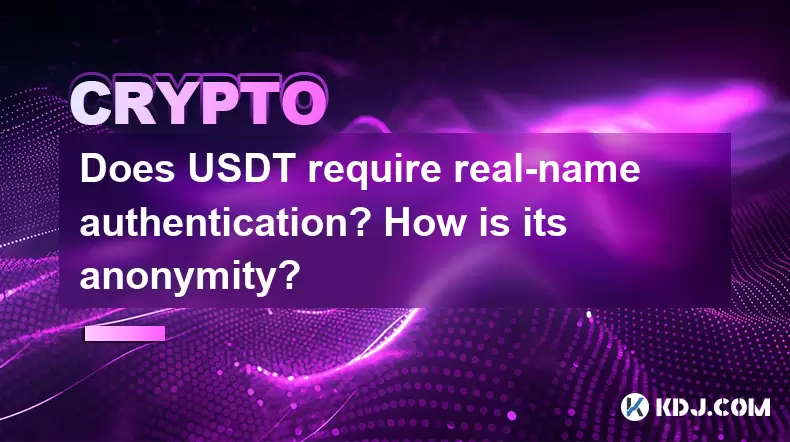
USDT, or Tether, is a popular stablecoin that is pegged to the value of the US dollar. One of the frequent questions asked by users is whether USDT requires real-name authentication and how its anonymity is maintained. In this article, we will delve into these aspects to provide a comprehensive understanding.
Understanding USDT and Its Issuance
USDT is issued by Tether Limited, a company that claims each token is backed by an equivalent amount of traditional currency held in reserve. This stablecoin operates on multiple blockchains, including Bitcoin (Omni Layer), Ethereum (ERC-20), and Tron (TRC-20), among others. The primary function of USDT is to provide a digital currency that maintains a stable value, making it useful for trading and as a store of value within the volatile cryptocurrency market.
Real-Name Authentication for USDT
When it comes to real-name authentication, the requirement can vary depending on the platform or exchange where USDT is being used. Not all platforms require real-name authentication for simply holding or transferring USDT. However, if you are engaging in activities that involve fiat currency conversions or significant transactions, you might be subject to Know Your Customer (KYC) and Anti-Money Laundering (AML) regulations.
- Exchanges and KYC/AML: Many cryptocurrency exchanges require users to complete KYC procedures, which include providing personal identification documents. This is to comply with regulatory standards and prevent illegal activities. If you purchase USDT using fiat currency on such platforms, you will likely need to go through real-name authentication.
- Decentralized Platforms: On decentralized exchanges or peer-to-peer platforms, the requirement for real-name authentication might be less stringent. Users can often trade USDT without providing personal information, maintaining a higher degree of anonymity.
Anonymity of USDT Transactions
The anonymity of USDT transactions largely depends on the blockchain on which the token is issued and the method of transaction. Here's a breakdown of how anonymity is maintained across different platforms:
- Bitcoin (Omni Layer): Transactions on the Bitcoin blockchain are pseudonymous, meaning they are linked to addresses rather than real identities. However, if these addresses are linked to KYC-verified accounts on exchanges, the anonymity can be compromised.
- Ethereum (ERC-20): Similar to Bitcoin, Ethereum transactions are pseudonymous. However, with the rise of decentralized finance (DeFi) platforms, some transactions might be more traceable if they interact with smart contracts that require identity verification.
- Tron (TRC-20): Transactions on the Tron network are also pseudonymous. The anonymity level is comparable to that of Bitcoin and Ethereum, but the lower transaction fees on Tron might make it more attractive for those seeking to maintain privacy.
Enhancing Anonymity with USDT
If you are concerned about maintaining anonymity while using USDT, there are several strategies you can employ:
- Use of Privacy Wallets: Wallets like Wasabi Wallet or Samourai Wallet can enhance the privacy of your transactions by implementing features like CoinJoin, which mixes your transactions with others to obscure the trail.
- Decentralized Exchanges: Trading on decentralized exchanges (DEXs) can help maintain anonymity as they often do not require KYC. Platforms like Uniswap or SushiSwap allow for direct trading of USDT without personal identification.
- VPN and Tor Network: Using a Virtual Private Network (VPN) or the Tor Network can add an extra layer of privacy by masking your IP address when accessing exchanges or wallets.
Regulatory Considerations
It is important to note that while USDT can be used anonymously to a certain extent, regulatory environments are evolving. Governments and financial institutions are increasingly focused on tracking cryptocurrency transactions to combat illegal activities. Therefore, even if you manage to maintain anonymity in your USDT transactions, you should be aware of the legal implications in your jurisdiction.
- Compliance with Local Laws: Always ensure that your use of USDT complies with the laws of your country. Some regions have strict regulations regarding cryptocurrency transactions, and non-compliance can lead to legal consequences.
- Reporting Requirements: In some cases, large transactions or suspicious activities might need to be reported to authorities. Understanding these requirements can help you navigate the use of USDT more safely.
Practical Steps for Using USDT Anonymously
If you wish to use USDT while maintaining anonymity, here are some practical steps you can follow:
- Choose the Right Blockchain: Opt for a blockchain that offers a good balance between transaction speed, fees, and privacy. For instance, the Tron network is known for low fees and can be a good choice for USDT transactions.
- Set Up a New Wallet: Use a new, dedicated wallet for USDT transactions to avoid linking your activities to other cryptocurrencies or personal information.
- Use Privacy-Enhancing Tools: Implement tools like CoinJoin or mixers to enhance the privacy of your transactions. These tools can help obscure the origin and destination of your USDT.
- Trade on DEXs: Utilize decentralized exchanges for trading USDT to avoid KYC requirements. Ensure you understand the risks associated with DEXs, such as smart contract vulnerabilities.
- Monitor Transaction Amounts: Keep your transaction amounts below thresholds that might trigger reporting requirements or attract regulatory scrutiny.
Frequently Asked Questions
Q1: Can I use USDT on any blockchain?A1: USDT is available on multiple blockchains, including Bitcoin (Omni Layer), Ethereum (ERC-20), and Tron (TRC-20). However, you need to ensure that the platform or wallet you are using supports the specific version of USDT you wish to transact with.
Q2: Is it possible to convert USDT to other cryptocurrencies anonymously?A2: Yes, it is possible to convert USDT to other cryptocurrencies anonymously, especially on decentralized exchanges that do not require KYC. However, the level of anonymity can vary depending on the platform and the tools you use.
Q3: Are there any risks associated with using USDT anonymously?A3: Yes, there are risks associated with using USDT anonymously. These include regulatory risks, potential loss of funds due to scams or hacks, and the challenge of recovering funds if something goes wrong, as anonymous transactions can be difficult to trace.
Q4: How can I ensure the security of my USDT transactions while maintaining anonymity?A4: To ensure the security of your USDT transactions while maintaining anonymity, use reputable wallets and exchanges, enable two-factor authentication, keep your software updated, and be cautious of phishing attempts. Additionally, using privacy-enhancing tools and being aware of the security practices of the platforms you use can help protect your transactions.
Disclaimer:info@kdj.com
The information provided is not trading advice. kdj.com does not assume any responsibility for any investments made based on the information provided in this article. Cryptocurrencies are highly volatile and it is highly recommended that you invest with caution after thorough research!
If you believe that the content used on this website infringes your copyright, please contact us immediately (info@kdj.com) and we will delete it promptly.
- Coinbase and Crypto ISAC Forge Alliance, Setting New Standards for Security Intelligence in the Digital Asset World
- 2026-01-31 04:35:01
- US Mint Honors Revolutionary War Hero Polly Cooper on 2026 Sacagawea Coin
- 2026-01-31 03:55:01
- Bitcoin Hits $83K Amidst Risk-Off Selling Frenzy, ETFs See Major Outflows
- 2026-01-31 04:35:01
- New 2026 Dollar Coin Shines a Light on Oneida Heroine Polly Cooper and America's First Allies
- 2026-01-31 04:15:01
- Polly Cooper, Oneida Woman, Honored on 2026 U.S. $1 Coin for Revolutionary War Heroism
- 2026-01-31 04:25:01
- Oneida Heroine Polly Cooper Immortalized on New $1 Coin: A Long-Overdue Tribute to Revolutionary Generosity
- 2026-01-31 04:25:01
Related knowledge
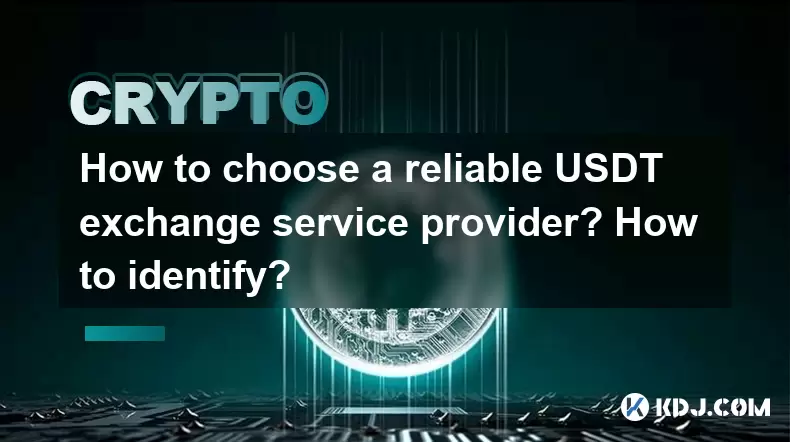
How to choose a reliable USDT exchange service provider? How to identify?
Jun 12,2025 at 03:15pm
Understanding the Role of USDT in Cryptocurrency TradingUSDT (Tether) is one of the most widely used stablecoins in the cryptocurrency market. It is d...
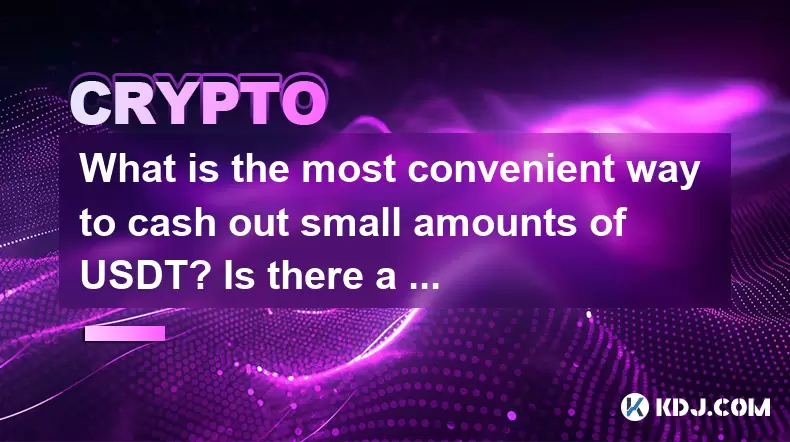
What is the most convenient way to cash out small amounts of USDT? Is there a shortcut?
Jun 11,2025 at 11:00pm
Understanding the Need to Cash Out Small USDT AmountsCashing out small amounts of USDT can be a challenge for many crypto users. Traditional methods o...
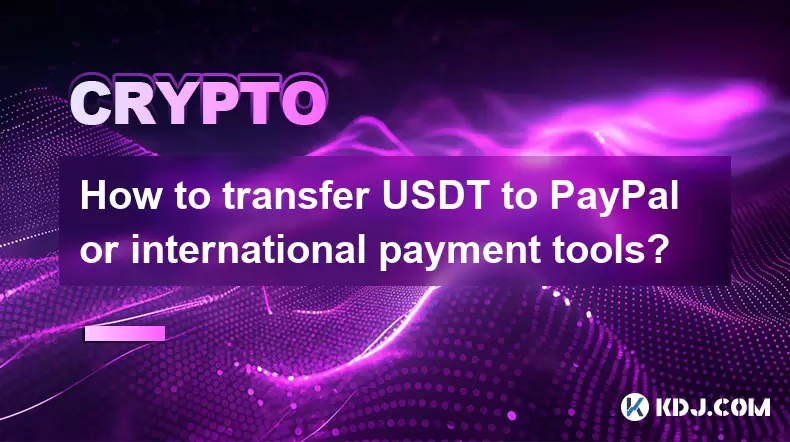
How to transfer USDT to PayPal or international payment tools?
Jun 15,2025 at 05:28am
Understanding the Basics of USDT and PayPal IntegrationUSDT (Tether) is a stablecoin pegged to the US dollar, offering blockchain-based value transfer...
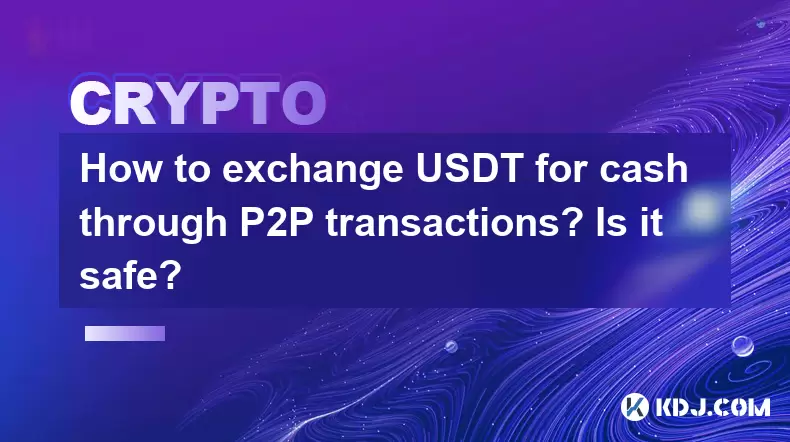
How to exchange USDT for cash through P2P transactions? Is it safe?
Jun 18,2025 at 07:56am
Understanding USDT and P2P TransactionsTether (USDT) is a stablecoin pegged to the value of the US dollar, making it a popular choice for users who wa...
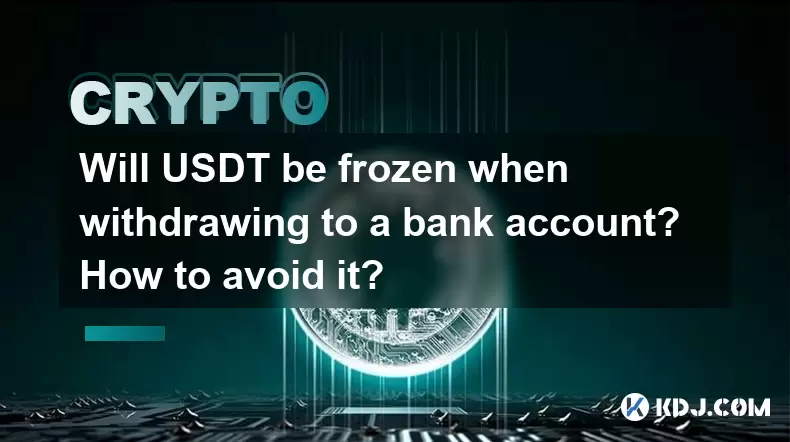
Will USDT be frozen when withdrawing to a bank account? How to avoid it?
Jun 15,2025 at 10:03am
Understanding USDT Withdrawals and Bank Account Freezing RisksWhen users decide to withdraw USDT (Tether) to a bank account, one of the most common co...

How to avoid risks when exchanging USDT for cash? What are the pitfalls?
Jun 11,2025 at 08:14pm
Understanding the Risks of Exchanging USDT for CashWhen exchanging USDT (Tether) for cash, users must be aware of the potential risks involved. As a s...

How to choose a reliable USDT exchange service provider? How to identify?
Jun 12,2025 at 03:15pm
Understanding the Role of USDT in Cryptocurrency TradingUSDT (Tether) is one of the most widely used stablecoins in the cryptocurrency market. It is d...

What is the most convenient way to cash out small amounts of USDT? Is there a shortcut?
Jun 11,2025 at 11:00pm
Understanding the Need to Cash Out Small USDT AmountsCashing out small amounts of USDT can be a challenge for many crypto users. Traditional methods o...

How to transfer USDT to PayPal or international payment tools?
Jun 15,2025 at 05:28am
Understanding the Basics of USDT and PayPal IntegrationUSDT (Tether) is a stablecoin pegged to the US dollar, offering blockchain-based value transfer...

How to exchange USDT for cash through P2P transactions? Is it safe?
Jun 18,2025 at 07:56am
Understanding USDT and P2P TransactionsTether (USDT) is a stablecoin pegged to the value of the US dollar, making it a popular choice for users who wa...

Will USDT be frozen when withdrawing to a bank account? How to avoid it?
Jun 15,2025 at 10:03am
Understanding USDT Withdrawals and Bank Account Freezing RisksWhen users decide to withdraw USDT (Tether) to a bank account, one of the most common co...

How to avoid risks when exchanging USDT for cash? What are the pitfalls?
Jun 11,2025 at 08:14pm
Understanding the Risks of Exchanging USDT for CashWhen exchanging USDT (Tether) for cash, users must be aware of the potential risks involved. As a s...
See all articles










































































